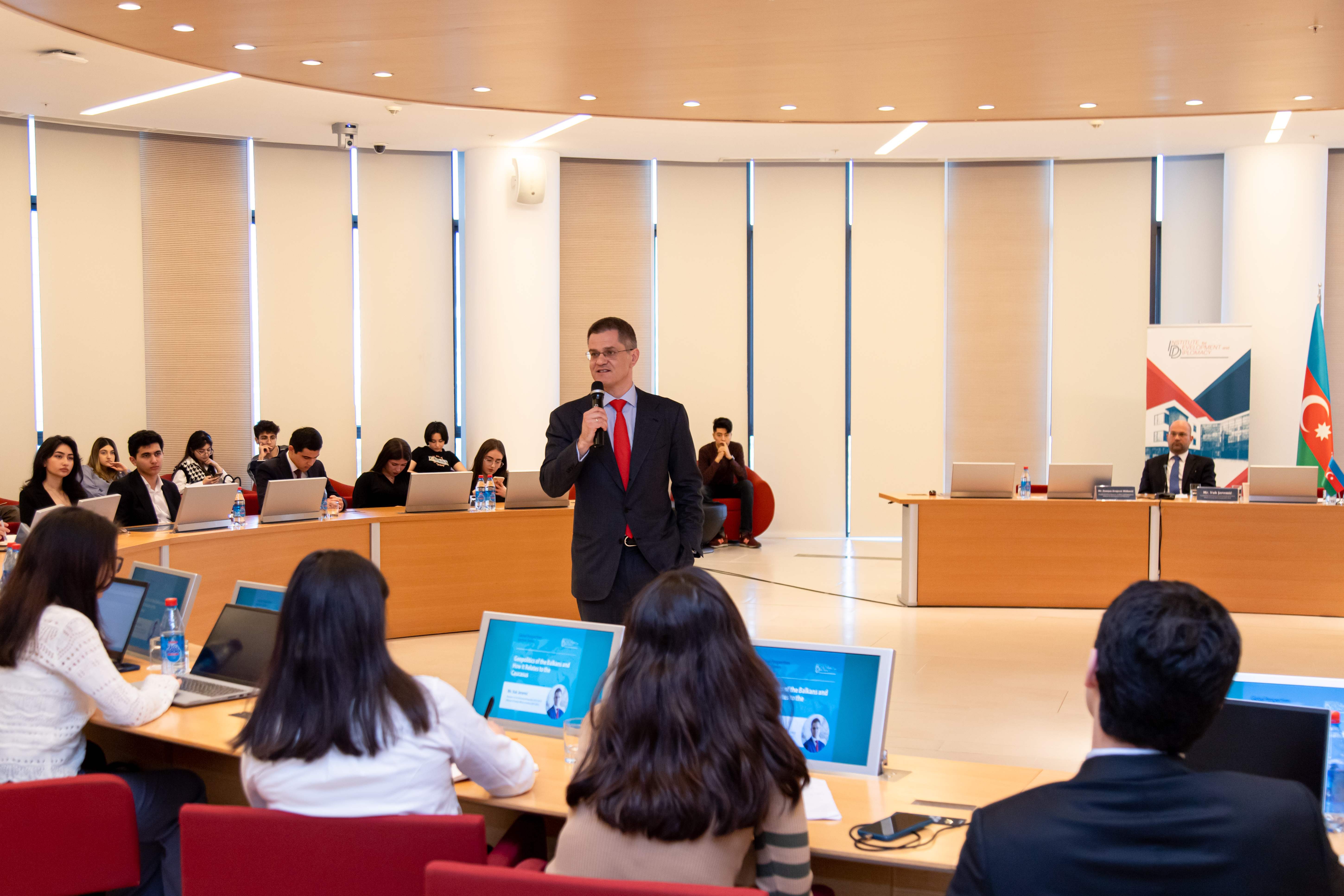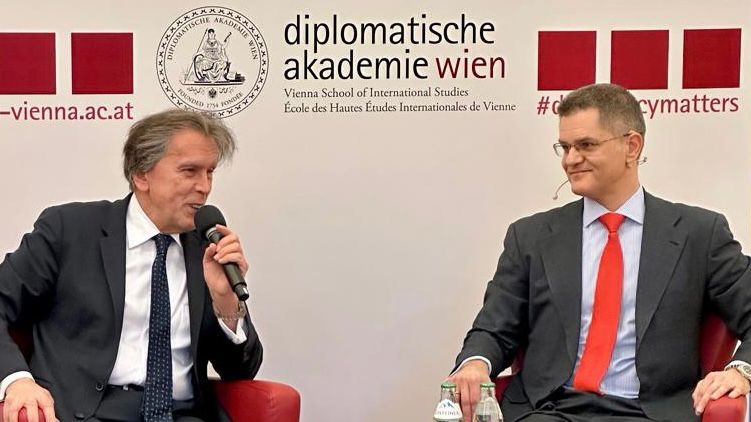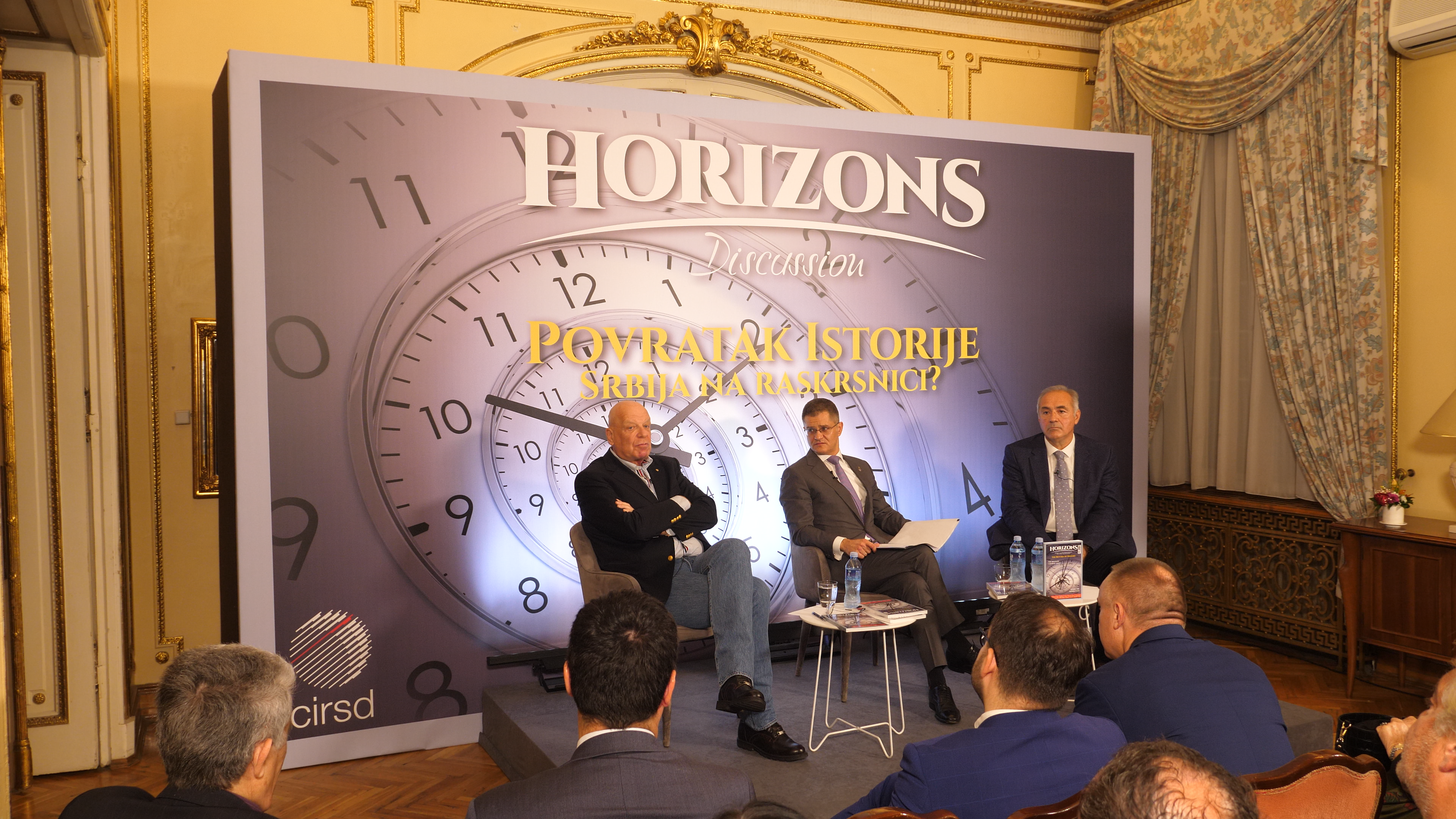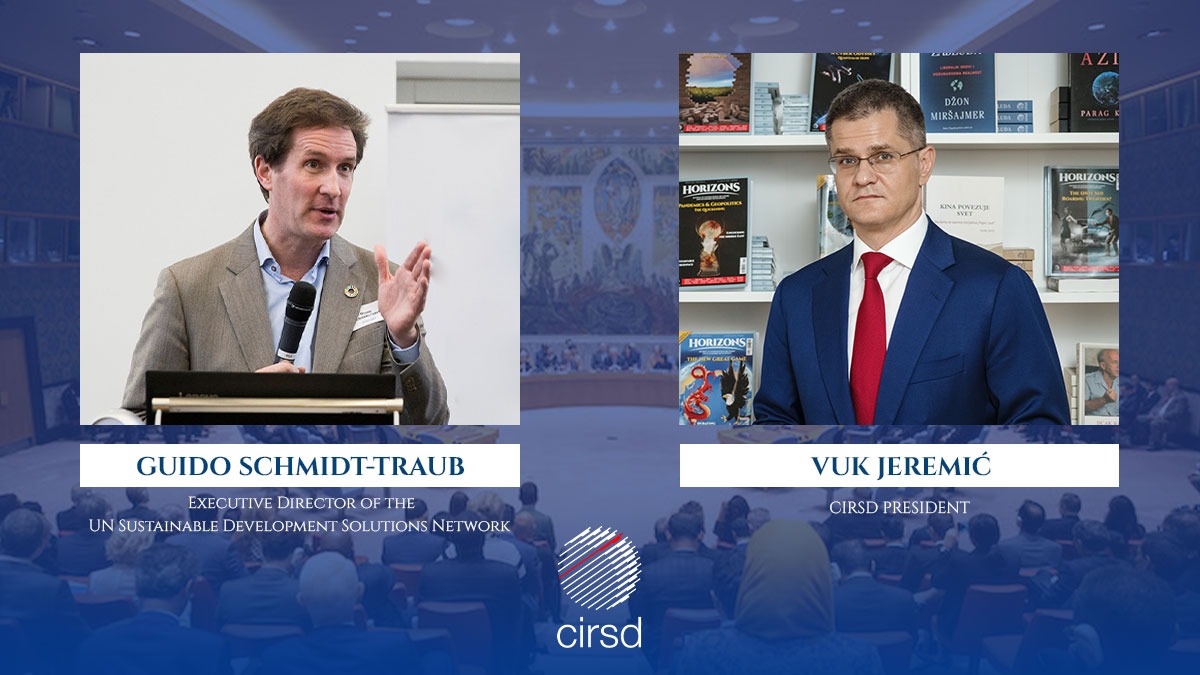Evropska tragedija 1914. i multipolarni svet 2014. godine: Istorijske pouke
Centar za međunarodnu saradnju i održivi razvoj (CIRSD) organizovao je dvodnevnu međunarodnu konferenciju „Evropska tragedija 1914. i multipolarni svet 2014. godine: Istorijske pouke“, u Beogradu, 30. i 31. maja 2014. godine. Na svakom od pet od panela, prisustvovalo je oko 350 ljudi. Još nekoliko hiljada pratilo je direktan prenos konferencije putem interneta, na CIRSD vebsajtu. Među učesnicima konferencije bili su renomirani svetski istoričari, profesori elitnih univerziteta, politički lideri, diplomate i intelektualci.
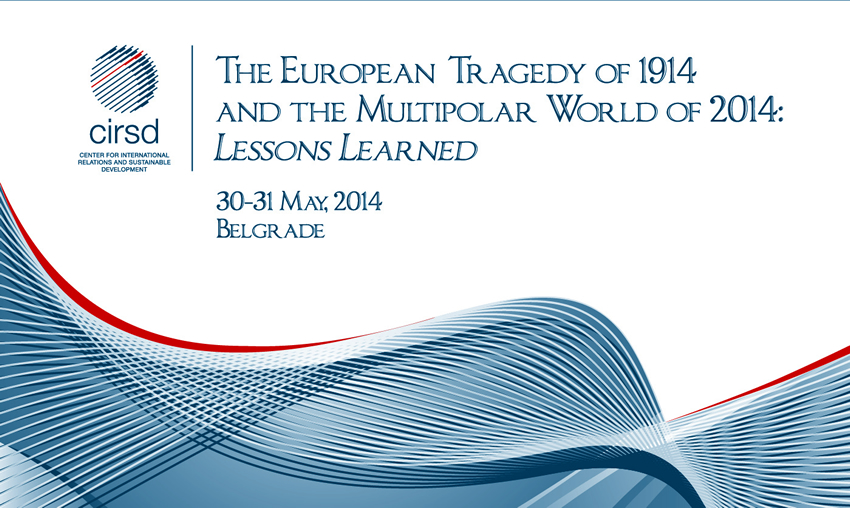
U petak, 30. maja 2014. godine, fokus konferencije bio je na uzrocima početka Prvog svetskog rata iz ugla istoričara. Tokom dve panel diskusije renomirani svetski istoričari poput Kristofera Klarka, Dominika Lievena, Hartmuta fon Štrandmana, Džona Kejgera, Gintera Kronenbitera, Lućiana Monzalija i Ekaterine Romanove dali su svoja tumačenja na pitanje da li je početak Velikog rata bio rezultat neuspeha diplomatije ili lošeg predviđanja dela političkih i vojnih elita. Na konferenciji su učestvovali i srpski profesori Leon Kojen, Vojislav Pavlović, Slobodan Marković i Dušan Bataković.
Osnivač Stratfora Džordž Fridman govorio je na početku drugog dana, 31. maja, i njegov govor je poslužio kao uvod za temu: primene pouka Prvog svetskog rata na aktuelna žarišta u svetu: Ukrajinu, Bliski istok i istočnu Aziju.
Na panelima o Ukrajini, Bliskom istoku i Istočnoj Aziji učestvovali su politički lideri, diplomate i intelektualci poput generalnog sekretara OEBS-a Lamberta Zanijera, bivšeg premijera Australije Kevina Rada, bivšeg zamenika ministra spoljnih polsova Japana Cunea Nišide, bivšeg potpredsednika vlade Izraela Haima Ramona, dobitnika Pulicerove nagrada kolumniste Vol Strit Žurnala Breta Stivensa, profesora Kolumbija univerziteta Džefrija Saksa, predsednice Fondacije za istorijske poglede u Moskvi Natalije Naročnickaje, profesorke medjunarodnih odnosa Nine Hruščove, Patrika Hoa, predsednika Komiteta kineskog energetskog fonda iz Hong Konga. Učesnici panela bili su i članovi medjunarodnog Savetodavnog odbora CIRSD-a. Od domaćih stručnjaka, na konferenciji su učestvovali i Darko Tanasković i Ljiljana Smajlović.
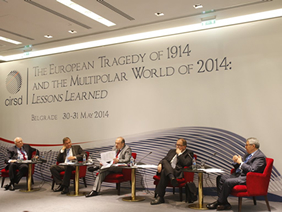 Nakon konferencije, profesor Klark je rekao da je ''CIRSD organizovao izuzetan skup na kome je uspeo da okupi na jednom mestu veliki broj istaknutih političkih lidera i intelektualaca, koji su imali priliku da razmene mišljenja u oblasti geopolitike iz ugla istorije''. Naglasio je da je konferencija ''obilovala kvalitetnom raspravom i da su se tokom diskusija uočile mnoge paralele između 1914. godine i sadašnje situacije u svetu''.
Nakon konferencije, profesor Klark je rekao da je ''CIRSD organizovao izuzetan skup na kome je uspeo da okupi na jednom mestu veliki broj istaknutih političkih lidera i intelektualaca, koji su imali priliku da razmene mišljenja u oblasti geopolitike iz ugla istorije''. Naglasio je da je konferencija ''obilovala kvalitetnom raspravom i da su se tokom diskusija uočile mnoge paralele između 1914. godine i sadašnje situacije u svetu''.
Šaukat Aziz, bivši premijer Pakistana, rekao je posle konferencije da je bila jako dobra ideja okupiti toliko važnih ljudi na jednom mestu, kako bi se prodiskutovalo o poukama izvučenim iz perioda Prvog svetskog rata. Inicijativu CIRSD-a je nazvao „brililjantnom i pravovremenom“.
Bivši ministar spoljnih poslova Španije i Specijalni predstavnik EU za Bliski istok Migel Anhel Moratinos izneo je svoj utisak da je konferencija bila „neverovatan uspeh“.
Evropska tragedija 1914. i multipolarni svet 2014. godine: Istorijske pouke
Program
Petak, 30 Maj 2014
10.00 - 10.30
|
Introductory remarks by H.E. Mr. Vuk Jeremić, CIRSD President
(Venue: Hotel Metropol Palace – Ivo Andrić Hall)
|
10.30 - 12.30
|
Panel “The Coming of World War I: What Kind of Failure?”
(Venue: Hotel Metropol Palace – Ivo Andrić Hall)
Moderator: Prof. Leon Kojen, Belgrade University
Participants:
-
Prof. Christopher Clark, University of Cambridge
-
Prof. Dominic Lieven, University of Cambridge
-
Prof. Harmut Pogge von Strandmann, University of Oxford
-
Dr. Vojislav Pavlović, Institute for Balkan Studies, Serbian Academy of Sciences and Arts
|
13.00 - 14.30
|
Luncheon
(Venue: Hotel Metropol Palace)
|
10.30 - 12.30
|
Panel “The Coming of World War I and the End of the Old Order”
(Venue: Hotel Metropol Palace – Ivo Andrić Hall)
Moderator: Prof. Slobodan Marković, Belgrade University
Participants:
-
Prof. Günther Kronenbitter, University of Augsburg
-
Prof. Ekaterina Romanova, Moscow State University
-
Prof. Luciano Monzali, University of Bari
-
Prof. John Keiger, University of Cambridge
-
Dr. Dušan Bataković, Institute for Balkan Studies, Serbian Academy of Sciences and Arts
|
Subota, 31 Maj 2014
09.00h - 09.45
|
Opening remarks by Mr. George Friedman, Stratfor
(Venue: Hotel Metropol Palace – Ivo Andrić Hall)
|
09.45 – 11.30
|
Panel “The Lessons of World War I and the 21st-century Middle East”
(Venue: Hotel Metropol Palace – Ivo Andrić Hall)
Moderator: H.E. Mr. Markos Kyprianou, Cyprus
Participants:
-
H.E. Mr. Haim Ramon, Israel
-
H.E. Dr. Mohamed Benaïssa, Morocco
-
H.E. Mr. Miguel Ángel Moratinos Cuyaubé, Spain
-
Prof. Darko Tanasković, Belgrade University
|
11.30 – 11.45
|
Coffee break |
11.45 – 13.30
|
Panel “The Lessons of World War I and the 21st-century East Asia”
(Venue: Hotel Metropol Palace – Ivo Andrić Hall)
Moderator: Mr. Bret Stephens, The Wall Street Journal
Participants:
-
The Hon. Kevin Rudd, Australia
-
H.E. Mr. Shaukat Aziz, Pakistan
-
H.E. Dr. N. Hassan Wirajuda, Indonesia
-
Dr. Patrick C.P. Ho, China
-
H.E. Mr. Tsuneo Nishida, Japan
|
13.30 – 15.00
|
Luncheon
(Venue: Hotel Metropol Palace) |
15.30 – 17.30
|
Panel “The Crisis in Ukraine: Winds of the New Cold War?”
(Venue: Hotel Metropol Palace – Ivo Andrić Hall)
Moderator: Mrs. Ljiljana Smajlović, Editor-in-Chief Politika newspaper
Participants:
-
H.E. Mr. Lamberto Zannier, OSCE Secretary General
-
Prof. Jeffrey D. Sachs, Columbia University
-
Prof. Natalia Narochnitskaya, Foundation for Historical Outlook
-
Prof. Nina Khrushcheva, New School University
|
The European Tragedy of 1914 and the Multipolar World of 2014: Lessons Learned
List of speakers
Leon Kojen
Leon Kojen is a Professor of Philosophy at the Faculty of Philosophy, University of Belgrade, where he has been teaching since 2003. He was formerly a Professor of Aesthetics and Literary Theory at the Faculty of Philology, University of Belgrade. He obtained his D.Phil. from Oxford University in 1978 and had previously thought at Williams College in the United States (1998-2001). He has published numerous books and papers in the field of philosophy and literary theory. Between 2004 and 2007, he served as a Political Adviser to the President of Serbia, Boris Tadić, and was one of the two coordinators of the Serbian negotiating team to the UN-sponsored Vienna negotiations on Kosovo in 2006-2007.
Christopher Clark
Christopher Clark is a Professor of Modern European History at the University of Cambridge and a Fellow of St Catharine's College, as well as a Fellow of the Australian Academy of Humanities. He is the author of various books on modern German and European history, including the one on the history of Prussia entitled Iron Kingdom: The Rise and Downfall of Prussia 1600-1947 (2006). His latest book is a study of the outbreak of the First World War entitled The Sleepwalkers: How Europe Went to War in 1914 (2012). Clark is a co-editor of the scholarly book series New Studies in European History published by Cambridge University Press. In October 2010, Germany awarded Clark the Officer's Cross of the Order of Merit of the Federal Republic of Germany, for his research which had “contributed greatly to German-British relations"
Dominic Lieven
Dominic Lieven is a Research Professor at the University of Cambridge (Senior Research Fellow – Trinity College) and a Fellow of the British Academy. His publications include: Russia Against Napoleon: The Battle for Europe, 1807 to 1814 (2009), Empire: The Russian Empire and its Rivals (2003), Nicholas II (1993), The Aristocracy in Europe 1815/1914 (1992), Russia's Rulers under the Old Regime (1989), and Russia and the Origins of the First World War (1983). He graduated from the University of Cambridge with a first class honours in 1973 and was a Kennedy Scholar at Harvard in 1973/4. Subsequently, he has been inter alia a Humboldt Fellow in Germany, and a visiting professor at Tokyo University and Harvard
Hartmut Pogge von Strandmann
Hartmut Pogge von Strandmann is a Professor of Modern History at Oxford and an Emeritus Fellow ofUniversity College, Oxford. He also served as a visiting professor in the United States, Germany and Namibia and has lectured across the UK, Germany, the U.S., Australia and Russia. His publications include: The Revolutions in Europe, 1848-1849: From Reform to Reaction (with Robert Evans) (2002), The Coming of the First World War (with Robert Evans) (2001), The Experience of World War I (with J. M. Winter, Robert Peberdy and Alan Bor) (1989), and Walther Rathenau: Industrialist, Banker, Intellectual, and Politician. Notes and Diaries 1907-1922 (Oxford 1988). Amongst his many scholarly articles, he has published The Political and Historical Significance of the Fischer Controversy, in Journal ofContemporary History, No. 48 (April 2013)
Vojislav Pavlović
Vojislav Pavlović studied history at the University of Belgrade, where he obtained his first Ph.D. His second Ph.D. on the history of French-Serbian relations during the First World War was awarded by theUniversity of Paris-Sorbonne. He worked as a researcher at the Institute of History of the Serbian Academy of Arts and Sciences, and continued his career as a history Lecturer at University of Belgrade, University of Limoges in France and the American University of Paris. Currently, Professor Pavlović is a member of the Institute of Balkan Studies within the Serbian Academy of Arts and Sciences in Belgrade. He has published books on US-Yugoslav relations during the Second World War, edited a volume on the Balkans during the Cold War period, and on Italy’s Strategies in the Balkans. His latest publication on the biography of Josip Broz Tito is in progress.
Slobodan G. Marković
Slobodan G. Marković is an Associate Professor at the Faculty of Political Science of the University of Belgrade where he teaches Political Anthropology and the Political History of South-East Europe. He is also a Senior Research Fellow at the Institute for European Studies in Belgrade and a Research Associate for South Eastern Europe at LSE. His publications include a monograph on the Serbian economist, politician and diplomat Chedomille Miyatovich entitled A Victorian Among Serbs (Belgrade, 2006), a monograph on British-(Balkan) Serbian relations: British Perceptions of Serbia and the Balkans 1903-1906(Paris, 2000), and (co-)edited collections of papers: Bicentenary of Serbian Diplomacy (Belgrade, 2013),Problems of Identities in the Balkans (Belgrade, 2006); Europe and the Western Balkans after the Big Enlargement (Belgrade, 2005) and Challenges to New Democracies in the Balkans (Belgrade, 2004).
Günther Kronenbitter
Günther Kronenbitter (Ph.D. 1992) currently teaches modern history and cultural anthropology at the University of Augsburg. He has been Visiting Professor at the University of Vienna (Austria), the Diplomatic Academy in Vienna and the University of Bern (Switzerland). From 2006 to 2009 he was Professor of History at Emory University, Atlanta. He specialises in 19th century German intellectual history, the history of international relations and military history, and the history of the Hapsburg monarchy. His dissertation on the conservative publicist Friedrich Gentz, Metternich’s advisor, was published in 1994. He is also the editor of Friedrich Gentz: Gesammelte Schriften, 12 vols. (Hildesheim: Olms, 1997-2004). Among his most recent publications are Krieg im Frieden”: Die Führung der k.u.k. Armee und die Grossmachtpolitik Oesterreich-Ungarns 1906 – 1914 (Munich: Oldenbourg, 2003) on the politics of the army in Austria-Hungary, a volume on military occupation, entitled Besatzung: Funktion und Gestalt militaerischer Fremdherrschaft von der Antike bis zum 20. Jahrhundert (edited with Markus Poehlmann and Dierk Walter) (Paderborn: Schoeningh, 2006), and a volume on non-state actors in warfare, entitled Die Rückkehr der Condotierri? Krieg und Militär zwischen staatlichem Monopol und Privatisierung: Von der Antike bis zur Gegenwart (Paderborn: Schoeningh, 2010), edited along with Stig Förster and Christian Jansen
Еkaterina Romanova
Еkaterina Romanova is an Associate Professor at The Lomonosov Moscow State University. In 2001-2002 she was a Fox International Fellow at Yale University. Her speciality lies within late 19th and early 20th century international relations. She is the author of a book entitled Road to war: Anglo-German conflict in 1898 – 1914 (Put’ k voine: Razvitie anglo-germanskogo konflikta, 1898 – 1914) (Moscow, 2008), chapters on international stability and the role of public opinion in foreign policy formation in theFoundations of International Relations Theory (Osnovy teorii mezhdunarodnykh otnoshenii) (Moscow, 2009) and more than 30 scholarly articles. She has written chapters on international relations during the First World War in First World War and the Destiny of the European Civilization (Pervaya mirovaya voina I sud’by evropeiskoi zivilizazii) to be published in July 2014 by Moscow University Press. She is currently working on the project “Russia in the Strategy of World War I”, pertaining to Anglo-Russian relations.
Luciano Monzali
Luciano Monzali is an Associate Professor at the Department of Political Science at the University of Bari Aldo Moro, Italy. He holds a Ph.D. in the History of International Relations obtained from the Faculty of Political Sciences, University La Sapienza in Rome. His publications include: The Italians of Dalmatia: From Italian Unification to World War I (2009), The Italian occupation of Yugoslavia 1941-1943 (with Francesco Caccamo) (2008), and The Dream of Hegemony. Italy, the Yugoslav Question and Central Europe 1918-1941 (2004)
John Keiger
John Keiger is a Professor and the Director of Research in the Department of Politics and International Studies, University of Cambridge. Until 2012 he was a Professor of International History, University of Salford, Manchester. He holds a degree in Political Science and International Relations from the Institut d’Etudes Politiques d’Aix-en-Provence and a Ph.D. in History from the University of Cambridge (Corpus Christi College 1980). Keiger’s research and publications have concentrated on the international history of Europe from the nineteenth to the twentieth centuries. He has been a Visiting Professor at the Institut d'Etudes Politiques, University of Aix-Marseille, the University of Clermont-Ferrand, the Institut d'Etudes Politiques in Paris (Sciences Po) and University of Paris 13. His publications include: France and the World Since 1870 (2001), Raymond Poincare (1997), and France and the Origins of the First World War (1983). He is a Fellow of the Royal Historical Society
Dušan Bataković
Dušan Bataković is the Director of the Institute for Balkan Studies of the Serbian Academy of Sciences and Arts. His area of expertise comprises the history of Serbia and the Balkans in the 19th and 20thcenturies, as well as the Franco-Serbian relations. In 2010, Bataković was elected as a member of the World Academy of Art and Science (WAAS). Bataković has served as ambassador of Serbia to France and Canada, having previously served as his country’s ambassador to the Hellenic Republic. His publications include: Serbia's Kosovo Drama: A Historical Perspective (2012), Les sources françaises de la démocratie serbe 1804-1914 (2013), and Histoire de peuple serbe (2005)
George Friedman
George Friedman is the Chairman of Stratfor, a company he founded in 1996 that is now a leader in the field of global intelligence. Friedman guides Stratfor's strategic vision and oversees the development and training of the company's intelligence unit. Dr. Friedman is the author of The New York Times best-seller The Next Decade, which forecasts the major events and challenges that
will test America and its presidents over the course
of the next decade. Dr. Friedman's previous book, The Next
100 Years, was also a New York Times best-seller and was published in over 20
languages. His other books on warfare and intelligence include: America's Secret War, The Future of War and The Intelligence Edge. He received his Bachelor's degree from the City College of the City University of New York and holds a Ph.D. in Government from Cornell University.
Markos Kyprianou
Markos Kyprianou is a lawyer based in Cyprus. He served as Foreign Minister of Cyprus from 2008 to 2011, and as EU Commissioner for Health and Consumer Protection from 2004 to 2008. He was previously EU Commissioner with responsibility for budgetary affairs, as well as Minister of Finance of Cyprus. Prior to that, he was elected three consecutive times to the Cypriot House of Representatives, serving his constituency for more than a decade. Mr. Kyprianou is a member of CIRSD Board of Advisers
Haim Ramon
Haim Ramon is an Israeli politician who served as a member of the Knesset between 1983 and 2009, and as both Vice Prime Minister and Minister in the Prime Minister's Office with responsibility for state policy. During his long political career in Israel, Mr. Ramon was Minister of Health and Minister of Justice. He was also a member of the Knesset Foreign Affairs and Defense Committee. He served as an officer in the Israel Air Force and holds a B.A. in Law from Tel Aviv University
Mohamed Benaïssa
Mohamed Benaïssa is currently the mayor of the Moroccan city of Assila and Secretary General of the Assilah Forum Foundation. He is a former Minister of Foreign Affairs and Cooperation of Morocco (1999-2007). He previously held the post of Minister of Culture (1985-1992) and was a member of the Moroccan House of Representatives from 1977 to 1992. Mr. Benaïssa also served with the United Nations and the UN Food and Agriculture Organization (1965-1976). He is a co-founder and Vice President of the Council for Arab and International Relations, and is a member of many international and regional organizations, including the Aspen Foreign Affairs Forum and the Aspen Food Security Strategy. Dr. Benaïssa is a member of CIRSD Board of Advisers
Miguel Ángel Moratinos Cuyaubé
Miguel Ángel Moratinos Cuyaubé is a collaborator of the Institute for Political Sciences of Paris (Sciences-Po) and a senior member of the team of the Global Dry Land Alliance in Qatar. From 1996 to 2003, he was the EU Special Representative for the Middle East Peace Process, and from 2004 to 2010 he served as Spain’s Minister of Foreign Affairs and Cooperation. During his tenure in office, he held the presidency of the United Nations Security Council and the chairmanships-in-office of the Organization for Security and Cooperation in Europe, the Council of Europe and the Council of the European Union. Mr. Moratinos is Honorary Chairman of the CIRSD Board of Advisers
Darko Tanasković
Darko Tanasković (PhD 1979) is a Lecturer at the Faculty of Orthodox Theology (Belgrade), the Academy for Diplomacy and Security (Belgrade) and the Faculty of Political Sciences (Banja Luka). Since 1990, he has been a Member of the Executive Committee of the Euro-Arab Itinerant University in Rome, and was nominated member of the Academy of European Sciences and Arts (Academia Scientiarum Et Artium Europea) in Salzburg in 1995. He is the President of the Council of the Diplomatic Academy at the Ministry of Foreign Affairs of Serbia and a member of the Foreign Policy Council of the Minister of Foreign Affairs. Professor Tanasković has published over 700 papers and woring papers. His booksinclude: The Sufism (with Ivan Šop,1981, 2011), Islam and Us (2000, four editions), Islam: Dogma and Life(2008,2010), and Neo-ottomanism ( 2010, 2011). From 1995 to 1999 he has served as ambassador of theFederal Republic of Yugoslavia to Turkey and to Azerbaijan (1998-1999), and from 2002 to 2008 as his country’s ambassador to the Holy See and the Sovereign Military Order of Malta. He speaks French,English, Arabic, Turkish, Italian and Russian
Bret Stephens
Bret Stephens is the Pulitzer Prize-winning foreign affairs columnist for The Wall Street Journal. Previously, he was editor-in-chief of the Jerusalem Post. He was raised in Mexico City and lives in New York City
Kevin Rudd
Kevin Rudd is a former Australian politician who served twice as Prime Minister of Australia, from 2007 to 2010, and again in 2013. He was also the Minister for Foreign Affairs from 2010 to 2012. He has been a member of the Australian Parliament for Griffith for 15 years, from 1998 to 2013. Mr. Rudd was the Leader of the Australian Labor Party from 2006 to 2010, and again in 2013. He served as a diplomat from 1981 to 1988. Kevin Rudd graduated with a first class honours in Asian Studies at the Australian National University in Canberra, majoring in Chinese Language and History. He is proficient in Mandarin Chinese
Shaukat Aziz
Shaukat Aziz is a member of several boards of commercial and non-profit entities around the world. Mr. Aziz was elected Prime Minister of Pakistan in 2004, following a five year tenure as the nation’s finance minister. He joined the government after a 30 year career in global finance. As Executive Vice President of Citibank, he held several senior management positions including head of institutional banking for Central Eastern Europe, the Middle East and Africa, and later for Asia-Pacific, followed by a stint as Chief Executive of its global wealth management business. Mr. Aziz is a member of CIRSD Board of Advisors
Hassan Wirajuda
Hassan Wirajuda is a member of Indonesia’s Council of Presidential Advisors and a co-founder the Indonesia School of Government and Public Policy. He served as Indonesia’s Minister of Foreign Affairs between 2001 and 2009, and initiated the Bali Democratic Forum and its implementing agency, the Institute for Peace and Democracy. A lawyer by training and a diplomat by profession, Dr. Wirajuda has helped to facilitate a number of regional and national peace initiatives, initiating the establishment of the Indonesian Commission of Human Rights. Dr. Wirajuda is a member of CIRSD Board of Advisors
Patrick Ho Chi Pin
Patrick Ho Chi Pin is the Deputy Chairman and the Secretary General of China Energy Fund Committee. Dr. Ho is a Former Secretary for Home Affairs of the Hong Kong Special Administrative Region (HKSAR) Government. Since 1993, he has been a member of the 8th, 9th, 10th, and 11th (National) Chinese People's Political Consultative Committee, and in 1995, he was appointed a member of the Preparatory Committee of the first HKSAR Government. He was the vice-chairman of the Hong Kong Policy Research Institute. In 1997, he became a member of the HKSAR Urban Council. In 2002, he joined the second term HKSAR Government as a Cabinet Member and the Secretary for Home Affairs
Tsuneo Nishida
Tsuneo Nishida is the Director of the Institute for Peace Science at Hiroshima University. He served as the Permanent Representative of Japan to the United Nations, from 2010. Prior to his appointment, Mr. Nishida was assigned as Japan’s Ambassador to Canada from 2007. Being with Japan’s Foreign Ministry since 1970, his career included service in the USSR and the USA, as well as designation to the post of the Japanese Consul-General in Los Angeles, a position he held between August 1999 and March 2001. He served as Deputy Vice-Minister for Foreign Policy from September 2002 and Deputy Minister for Foreign Affairs in Tokyo from August 2005
Ljiljana Smajlović
Ljiljana Smajlović is a Serbian journalist and the editor-in-chief of Politika, the oldest daily newspaper in the Balkans. Since 2009, Smajlović has been the president of the Serbian Journalists' Association (UNS). From 1996 to 2005, Smajlović was a consultant for the InternationalResearch & Exchanges Board (IREX). She began her career as a journalist at Sarajevo'sOslobođenje daily newspaper in 1978. In 1992, she moved to Belgrade where she began working for the Vreme weekly magazine. In 1994, she received a fellowship from the Woodrow Wilson International Center for Scholars and moved to the United States for a year, continuing to write for Vreme as a foreign correspondent. She was a foreign editor for the bi-weekly magazineEvropljanin in 1998 and wrote a weekly columns for the Serbian newsmagazine NIN
Leamberto Zannier
Lamberto Zannier is the Secretary General of the Organization for Security and Co-operation in Europe (OSCE). From June 2008 to June 2011, Zannier served as the United Nations Special Representative for Kosovo and Head of the United Nations Interim Administration Mission in Kosovo (UNMIK), with the rank of UN Undersecretary-General. Zannier previously served in the foreign service of Italy for morethan 30 years. During his long diplomatic career, he served in Rome, Abu Dhabi and Vienna, mainly specialising in multilateral and security affairs. He has authored several publications on security, conflict prevention and crisis management issues. He holds a Ph.D. in International Law, which he obtained from the University of Trieste, in 1976
Jeffrey Sasch
Jeffrey Sachs is the Director of The Earth Institute, Quetelet Professor of Sustainable Development, and Professor of Health Policy and Management at Columbia University. He is Special Advisor to United Nations Secretary-General Ban Ki-moon on the Millennium Development Goals, and is the Director of the UN Sustainable Development Solutions Network. He is also co-founder and Chief Strategist of the Millennium Promise Alliance, and is the Director of the Millennium Villages Project. Dr. Sachs is one of the world’s leading expert on economic development and the fight against poverty. His work on fighting hunger and disease, and promoting economic growth and sustainable environmental practices, has taken him to more than 125 countries with more than 90 percent of the world’s population. For more than a quarter century he has advised dozens of statesmen on economic strategy in the Americas, Europe, Asia, Africa, and the Middle East. Prof. Sachs is a member of CIRSD Board of Advisers
Nataliya Narotchnitskaya
Nataliya Narotchnitskaya is a Russian politician, historian and diplomat. She is the President of the Foundation for Historical Outlook in Moscow. Narochnitskaya was a member of the State Duma of the Russian Federation from 2003 to 2007, Vice-Chairman of the Foreign Affairs Committee, Chairman of the Committee for the Study of the Practice and Implementation of Human Rights and Civil Liberties, and a member of the Russian delegation to the Parliamentary Assembly of the Council of Europe. From 1982 to 1989, she served in the Soviet diplomatic mission to the United Nations in New York. She has a doctorate in history. For many years she worked at the Institute of World Economics and International Relations in the Russian Academy of Sciences. A frequent commentator in the Russian mass media, she is an author of several works dedicated to Russian history and international affairs. From 2008, Narochnitskaya has been the Director of the Paris Office of the Russian Institute of Democracy and Cooperation
Nina Khrushcheva
Nina Khrushcheva is an Associate Professor in the Graduate Program of International Affairs at The New School and a Senior Fellow of the World Policy Institute. Khrushcheva obtained a degree from Moscow State University with a major in Russian in 1987 and a Ph.D. in Comparative Literature from Princeton University in 1998. From 2002 to 2004, she was Adjunct Assistant Professor at the School of International and Public Affairs at Columbia University. Her articles have appeared in Newsweek, The New York Times, The Wall Street Journal, The Financial Times and other prominent publications. She is the author of Imagining Nabokov: Russia Between Art and Politics (2008), and The Lost Khrushchev: A Journey Into the Gulag of the Russian Mind. She is also an editor of and a contributor to Project Syndicate
Evropska tragedija 1914. i multipolarni svet 2014. godine: Istorijske pouke
Evropska tragedija 1914. i multipolarni svet 2014. godine: Istorijske pouke
Evropska tragedija 1914. i multipolarni svet 2014. godine: Istorijske pouke
Evropska tragedija 1914. i multipolarni svet 2014. godine: Istorijske pouke
Evropska tragedija 1914. i multipolarni svet 2014. godine: Istorijske pouke
Evropska tragedija 1914. i multipolarni svet 2014. godine: Istorijske pouke
Evropska tragedija 1914. i multipolarni svet 2014. godine: Istorijske pouke
REZIME KONFERENCIJE
|
 |
CIRSD’s international conference was held in Belgrade on 30–31 May 2014 and featured renowned historians, opinion-makers and political gures. Several hundred people attended each of its ve sessions, with several thousand more following the proceedings via a live webcast provided on the CIRSD website.
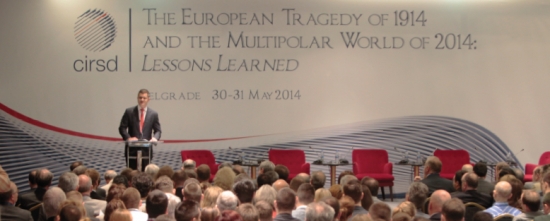
“…A rich and extremely stimulating conference… The themes were well-chosen and the discussion sessions were superb. The selection of people was wonderful—what riches! The whole thing was a triumph of intellectual entrepreneurship and social and political insight.” – Christopher Clark, University of Cambridge
In delivering his introductory address, CIRSD President Vuk Jeremic said that present international circumstances are not so unlike those of a hundred years ago: while much has changed, the type of global situation characterized by “miscalculation, misperception, and the adoption of maximalistic goals” is strikingly similar.
Ukraine is the theatre where this parallel is most clearly seen, Jeremic said. Recent events have led to a decrease in cooperation in various areas, from the Security Council to several Middle Eastern issues, notably Syria and the Iranian nuclear program. Other Middle Eastern developments affected by current international tensions include the exacerbation of longstanding frictions between Sunni and Shi’a, the rise of inuence of non-state actors and radical political movements, and the further waning of prospects for reviving the Israeli-Palestinian peace process.
“Asian developments will be strongly influenced by the changing dynamics in the U.S.–China–Russia triangle … as each seems set to intensify the application of a ‘competitive cooperation’ strategy.” – Vuk Jeremic, CIRSD President
In addition to the age-old challenges to international peace and security, technological innovations have increased the risk of massive destruction in the 21st-century. “But in our times,” Jeremic added, “humanity faces an additional danger—an existential crisis unlike any the world has experienced so far: the rapid physical deterioration of the Earth itself.” Leaders need to put “sustainable development at the heart of the conduct of international relations in the 21st century.” Embracing this core idea of the UN Post-2015 Agenda could bring to pass a new global compact that “at long last steps beyond the shadow cast by the Great War over the world for the past hundred years.”
The remainder of the CIRSD conference’s rst day featured remarks by world-renowned historians such as Christopher Clark, Dominic Lieven and John Keiger of the University of Cambridge; Hartmut Pogge von Strandmann of the University of Oxford; Günther Kronenbitter of the University of Augsburg; and Ekaterina Romanova of the Lomonosov Moscow State University. Serbian professors who took part in this portion of the debate were Leon Kojen, Vojislav Pavlovic, Slobodan Markovic and Dušan Batakovic, which examined whether the outbreak of the First World War was a failure of diplomacy, or a failure of foresight on the part of political and military elites.
“The First World War originated in the struggle between the Germanic powers and Russia for domination in Eastern Europe, and ends contrary to any prediction: with the defeat of all East European empires. You cannot build a stable European settlement against the two most powerful countries on the continent.” – Dominic Lieven, University of Cambridge
Some panelists advanced variations of the thesis rst put forth by the eminent historian Fritz Fischer in the 1960s that Germany bore primary responsibility for the outbreak of the Great War, underlining that the July 1914 Crisis serving as a pretext for a conict long in the making.
Hartmut Pogge von Strandmann said that Berlin had been pushing for a preemptive war for several decades, while seeking to portray it as a defensive action. Günther Kronenbitter stressed the heightened dangers of an international situation characterized by newcomers wanting to rise in status to become Great Powers while others feared losing their long-held positions. John Keiger noted that Europe in 1914 was divided between satised states keen to maintain the status quo, and non-satised states seeking to alter the balance of power in their favor. Ekaterina Romanova stressed that much of the pre-July Crisis antagonism between European imperial states was focused not only on the Balkans, but the Middle East as well.
Other panelists, most notably Prof. Christopher Clark, the author of the international best seller The Sleepwalkers: How Europe Went to War in 1914, argued that assigning guilt solely to Germany would not be opportune. The main question should not be ‘who’ but rather ‘how’ the peace turned into war. Clark drew extensive parallels between the world of 1914 and 2014, noting that once again that we nd ourselves in a multipolar and complex world characterized by a low level of trust and a high degree of misunderstanding and even paranoia, he concluded.
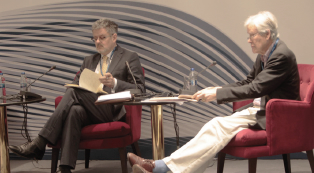 “In 1914 … the Great Powers were behaving in a more or less similar way—rather ruthlessly. … What we need to do is move away from the idea that war is a suitable or rational way of resolving human conflict, and come instead to an acceptance of view that war is the greatest failure of humankind.” – Christopher Clark, University of Cambridge
“In 1914 … the Great Powers were behaving in a more or less similar way—rather ruthlessly. … What we need to do is move away from the idea that war is a suitable or rational way of resolving human conflict, and come instead to an acceptance of view that war is the greatest failure of humankind.” – Christopher Clark, University of Cambridge
The second day of the CIRSD conference began with a keynote address by New York Times best-selling author and distinguished head of Stratfor George Friedman. His remarks provided an important intellectual signpost for the remainder of the proceedings, which focused on exploring how lessons learned from a century ago could be applied to three critical theatres in contemporary international relations: Ukraine, the Middle East, and East Asia.
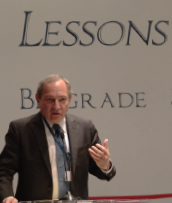 “We are now at the end of the post-Cold War era that began with the collapse of the Soviet Union, the end of the Japanese economic miracle, the events in Tiananmen, the signing of the Maastricht Treaty, and Operation Desert Storm. These events framed a new international reality, held up by three main pillars. The first one was the United States, the second was Europe coming together not only as a free trade zone but promising to emerge ultimately as the United States of Europe—the enormously wealthy and powerful region counterbalancing the United States—and the third one was China. Between August 8th 2008 and September 15th 2008, this world began going to pieces.” – GeorgeFriedman, Stratfor
“We are now at the end of the post-Cold War era that began with the collapse of the Soviet Union, the end of the Japanese economic miracle, the events in Tiananmen, the signing of the Maastricht Treaty, and Operation Desert Storm. These events framed a new international reality, held up by three main pillars. The first one was the United States, the second was Europe coming together not only as a free trade zone but promising to emerge ultimately as the United States of Europe—the enormously wealthy and powerful region counterbalancing the United States—and the third one was China. Between August 8th 2008 and September 15th 2008, this world began going to pieces.” – GeorgeFriedman, Stratfor
Other participants in the second day of the CIRSD conference included OSCE Secretary General Lamberto Zannier; former Australian Prime Minister Kevin Rudd; former Japanese Deputy Foreign Minister Tsuneo Nishida; former Israeli Vice Prime Minister Haim Ramon; Pulitzer Prize-winning Wall Street Journal foreign affairs columnist Bret Stephens; Russian politician and public intellectual Natalia Narochnitskaya; the granddaughter of Soviet leader Nikita Khrushchev and professor of international relations at the New School in New York Nina Khrushcheva; and the head of Hong Kong’s premier think-tank the China Energy Fund Committee (CEFC) Patrick Ho. Local experts who participated in second day of the conference were Prof. Darko Tanaskovic and Ljiljana Smajlovic.
Members of the CIRSD Board of Advisors also participated actively in these discussions, including former Spanish Foreign Minister and EU Special Representative for the Middle East Peace Process Miguel Ángel Moratinos Cuyaubé; former Deputy Prime Minister and Foreign Minister of Kuwait Sheikh Muhammad Sabah Al-Salem Al-Sabah; Pakistan’s former Prime Minister and Finance Minister Shaukat Aziz; former Senegalese Foreign Minister Cheikh Tidiane Gadio; Indonesia’s former Foreign Minister N. Hassan Wirajuda; former Cypriot Foreign Minister and EU Commissioner Markos Kyprianou; former Foreign Minister
and Culture Minister of Morocco Mohamed Benaïssa; and the Director of the Earth Institute at Columbia University and renowned economist Prof. Jeffrey Sachs.
“Francis Fukuyama’s thesis about the end of history is not applicable to the Middle East. The concept of history to the people of the Middle East is a bit different than for the rest of the world because we are living in it constantly.” – Sheikh MuhammadSabah Al-Salem Al-Sabah, former Deputy Prime Minister and Foreign Minister of Kuwait
In discussing the lessons of the First World War for the 21st-century Middle East, panelists afrmed the importance of this region of unparalleled hydrocarbon wealth, whose complex blend of faiths and civilizations constitutes a unique historical legacy. Haim Ramon said that everyone knows the nal outcome to the Israeli-Palestinian peace process will be a Two-State Solution: “aone-state solution would mean the end of Israel’s Jewish and democratic state. A Two-State Solution is in the essential interest of the existence of Israel,” he said. Mohamed Benaïssa focused his remarks on the dangers of political Islam to the future of theMiddle East. He added that the First World War sowed the seeds of mistrust towards the West, which also gave rise to a “crisis of identity in the Afro-Arab world.” Miguel Moratinos echoed these themes, while drawing numerous structural parallels between 1914 and 2014, arguing that the old balance of power logic failed then and will fail now. “We must instead have recourse to
multilateral tools,” he concluded.
“Globalization has not changed everything: the power and potency of deep nationalism still exists around the globe. If you look at the Asia Pacific region, it is a dynamic, productive and highly engaged 21st-century economy sitting across the top of a positively 19th-century set of security policy realities, outstanding unresolved territorial disputes, and nationalisms. We too can drift into conflict in Asia.” – Kevin Rudd, former Australian Prime Minister
Shaukat Aziz said that one lesson learned from a century ago is that countries should enter into alliances with greater care and prudence, for in 1914 they proved to be a conict catalyst instead of a conict prevention mechanism. A more multilateralist approach, combining political, security, and economic factors, is the way forward: “The more linkages and interdependencies we create between states, the more incentives they will have to preserve peace and resolve tensions at a negotiating table,” he concluded.
Hassan Wirajuda argued that ASEAN countries need to strengthen all-around cooperation with other parts of East Asia. “We should be deant in creating a kind of community of power of a Wilsonian-type to organize common peace,” he said. Tsuneo Nishida said that East Asia has neither been, is, nor will be dominated by a single power, while expressing Japanese concern for the rise of China. Patrick Ho noted that although China sat with the victors at Versailles in 1919, its outcome was detrimental to Beijing’s interests, setting the stage for the formation of the Chinese Communist Party in 1921. He underlined that the biggest enemy of stability and security is not any particular country, but climate change.
“Climate change gradually and insidiously erodes our way of potential to support ourselves; this is something that we need to face together—not as nations, but as a generation of people. Although we have different past, we have a common future to face.” – Patrick Ho, CEFC
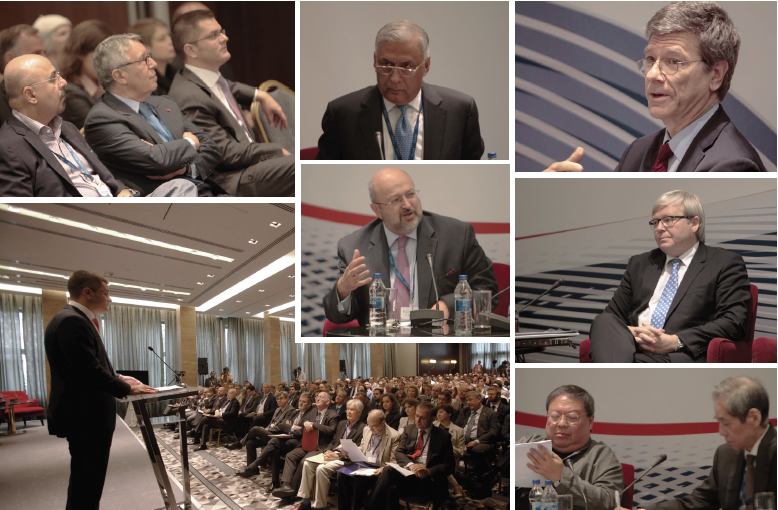
The final session of the CIRSD conference, entitled “The Crisis in Ukraine: Winds of the New Cold Was?” focused on the geopolitics of the latest developments in the European borderlands.
“There are tendencies to use the past in order to justify an interpretation of what should happen in the future. That is very dangerous. … International law must be the way forward: we need rules, and we need to stick to the rules.” – Lamberto Zannier, OSCE Secretary General
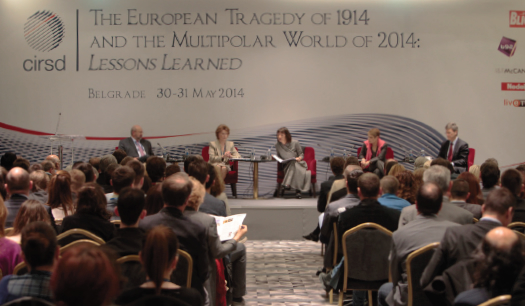 Panelists approached the crisis in Ukraine from different and sometimes conicting vantage points, but all seemed to agree that Russia, the EU and the United States are making moves in an increasingly tumultuous region of Eastern Europe in which each party seek to alter the balance of power in their favor. Natalia Narochnitskaya explained that Ukraine’s former President Viktor Yanukovych understood too late that the proposed association agreement with the EU would “destroy Ukrainian industry, primarily located in the east of the country.”
Panelists approached the crisis in Ukraine from different and sometimes conicting vantage points, but all seemed to agree that Russia, the EU and the United States are making moves in an increasingly tumultuous region of Eastern Europe in which each party seek to alter the balance of power in their favor. Natalia Narochnitskaya explained that Ukraine’s former President Viktor Yanukovych understood too late that the proposed association agreement with the EU would “destroy Ukrainian industry, primarily located in the east of the country.”
Nina Khrushcheva gave a critical account of Russia’s contemporary leadership, expressing fear that that it might be tempted to consider the use of its nuclear arsenal as the crisis in Ukraine unfolded.
Jeffrey Sachs argued that mistrust between the United States and Russia can be traced back to 1991.
“Shortsightedness prevailed in… 1991. We lost an opportunity historically to create a unique space of prosperity that would have made a very big difference. There was no magnanimity at all in 1991. There could have been a more unified world that we need today. … You never know whether the option of hoping for the best will work or not… But in general in life, it is better to try that, than to presume the failure.” – Jeffrey Sachs, Columbia University
Sachs concluded that Russia’s only way to succeed is to be part of the global economy and to cooperate economically with Europe. If Ukraine is destabilized by Russia, the breakdown of economic relations between Europe and Russia will be extraordinary, he added. Russia’s hope lies in engaging with the hi-tech world, not with low-tech neighbors, he concluded.
“I think it’s a great idea to … analyze, study, and discuss the First World War so we don’t repeat the same mistakes which led us to it. And I think today’s discussion tells us that there is a lot of learning to be had. Getting so many good speakers and senior leaders from around the world is a tribute to … CIRSD. This is a very brilliant and timely initiative; we need ... peace, which must be achieved with strength, not weakness—because if it achieved with weakness it will be vulnerable. We don’t want vulnerable peace; we need sustainable peace.” – Shaukat Aziz, former Prime Minister of Pakistan
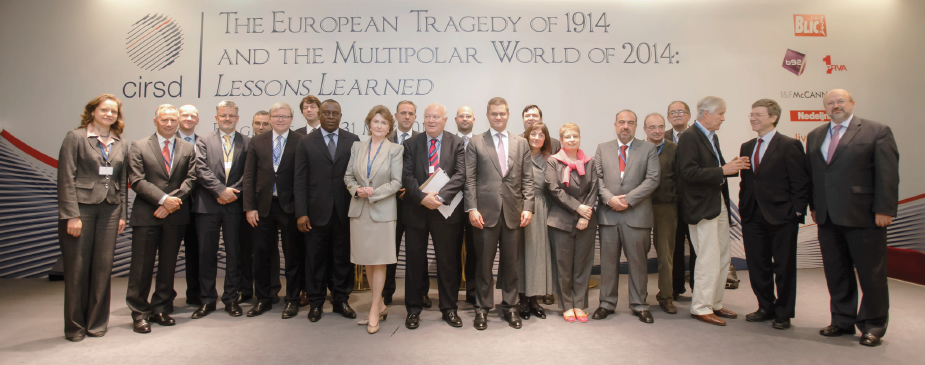


 Nakon konferencije, profesor Klark je rekao da je ''CIRSD organizovao izuzetan skup na kome je uspeo da okupi na jednom mestu veliki broj istaknutih političkih lidera i intelektualaca, koji su imali priliku da razmene mišljenja u oblasti geopolitike iz ugla istorije''. Naglasio je da je konferencija ''obilovala kvalitetnom raspravom i da su se tokom diskusija uočile mnoge paralele između 1914. godine i sadašnje situacije u svetu''.
Nakon konferencije, profesor Klark je rekao da je ''CIRSD organizovao izuzetan skup na kome je uspeo da okupi na jednom mestu veliki broj istaknutih političkih lidera i intelektualaca, koji su imali priliku da razmene mišljenja u oblasti geopolitike iz ugla istorije''. Naglasio je da je konferencija ''obilovala kvalitetnom raspravom i da su se tokom diskusija uočile mnoge paralele između 1914. godine i sadašnje situacije u svetu''.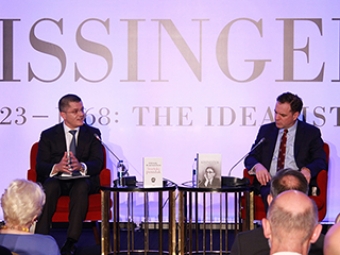
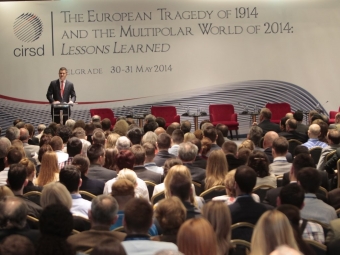
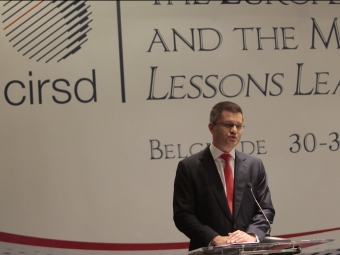
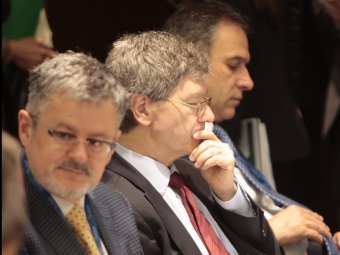
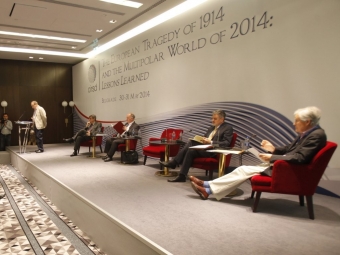
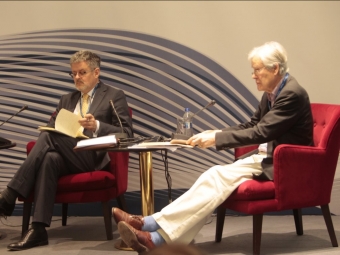
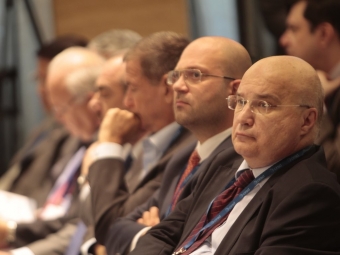
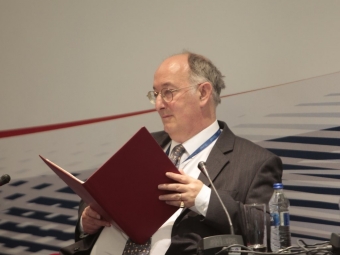
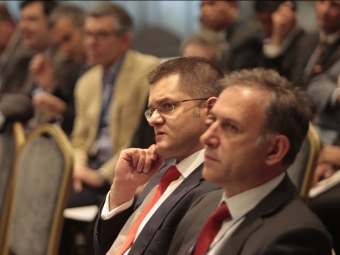
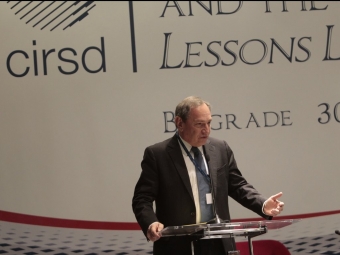
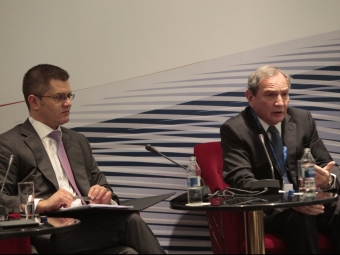
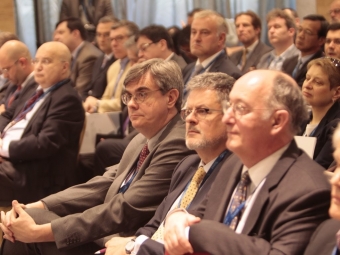
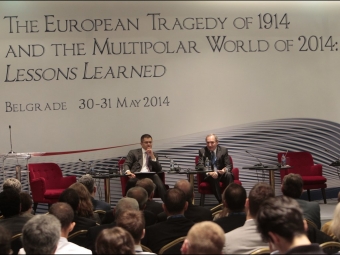
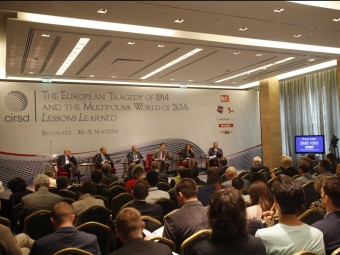
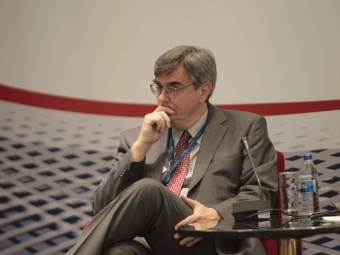
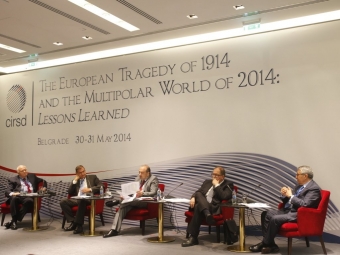
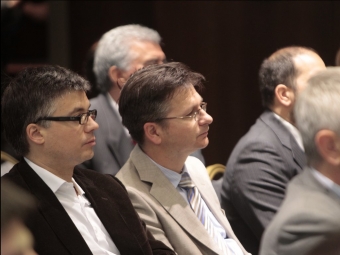
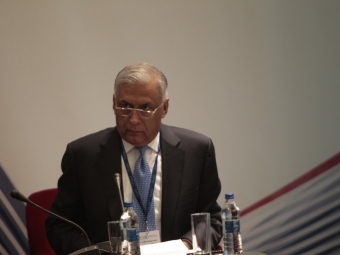
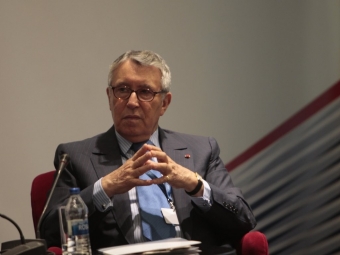
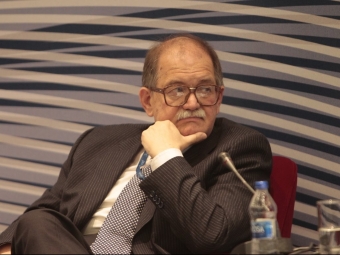
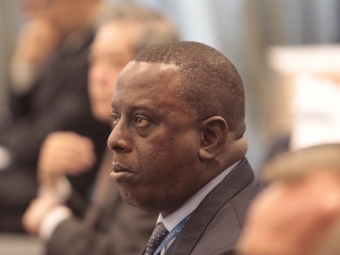
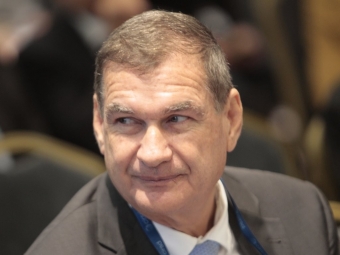
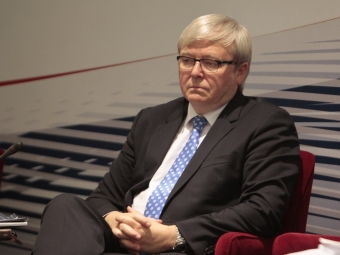
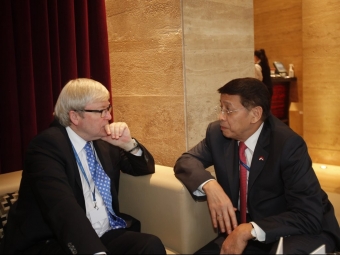
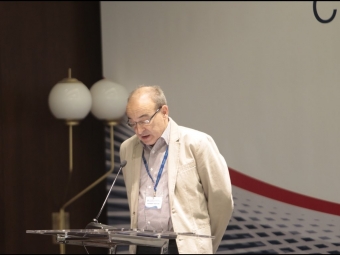
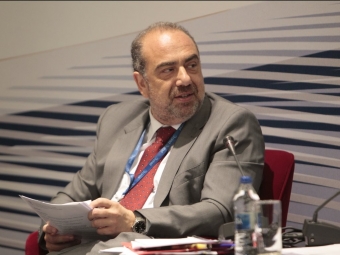
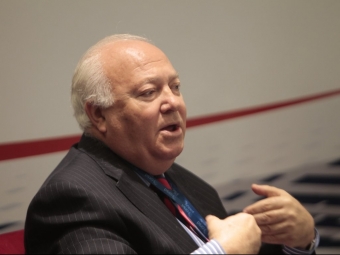
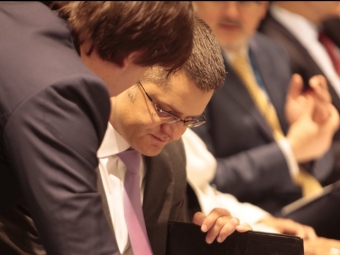
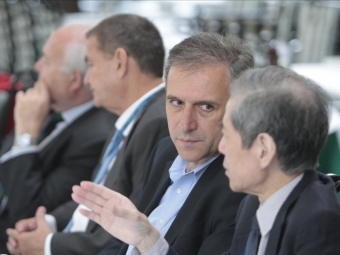
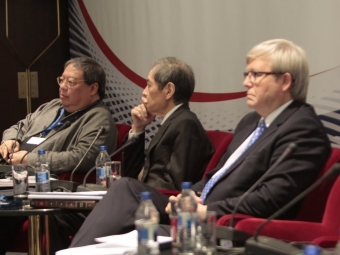
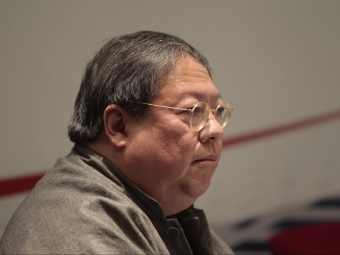
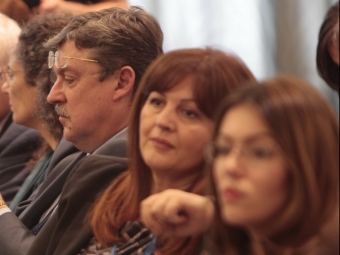
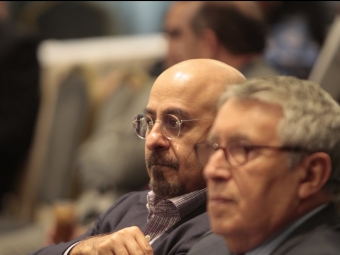
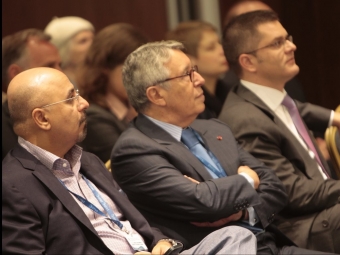
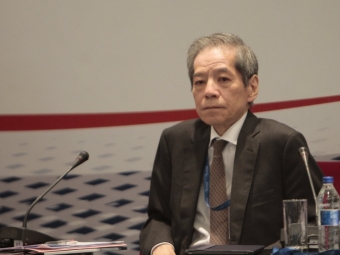
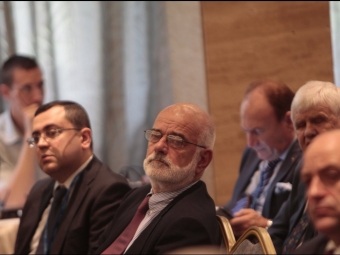
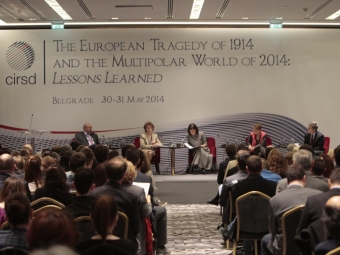
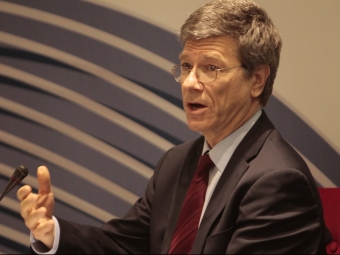
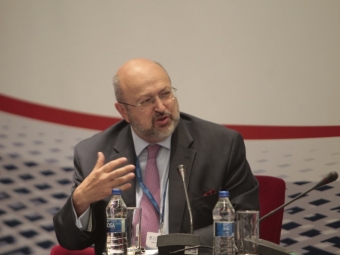
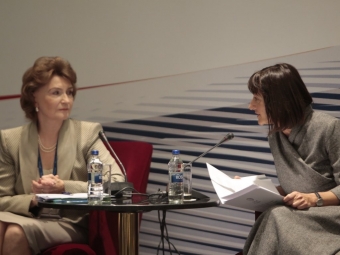
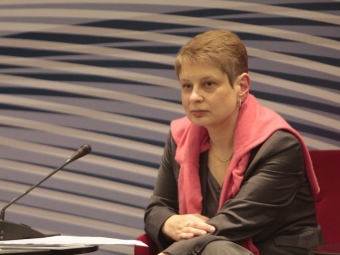
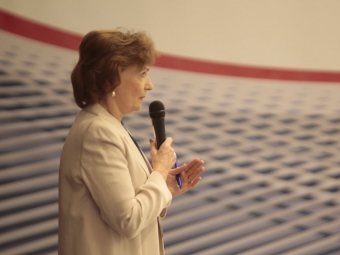
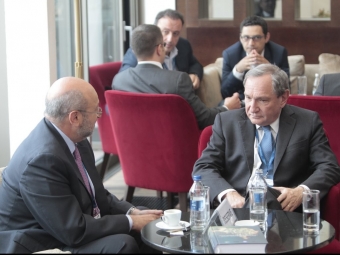
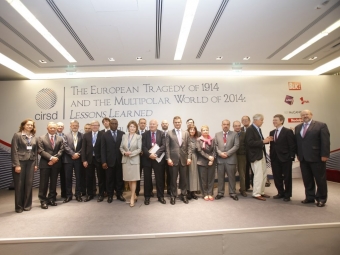
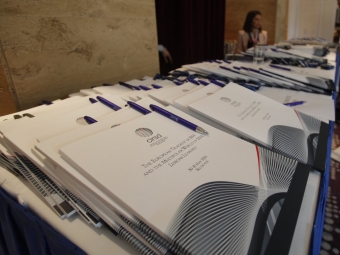
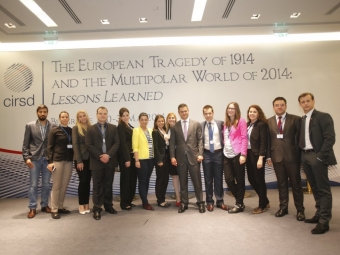
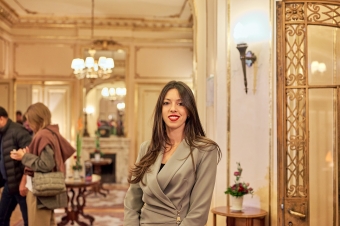
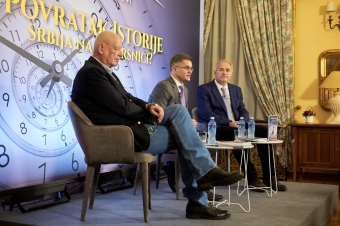
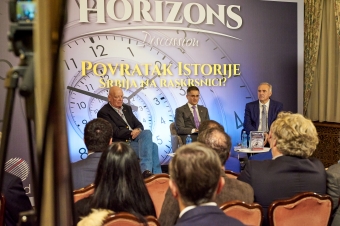
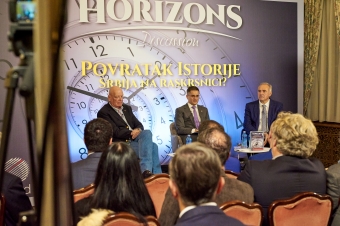
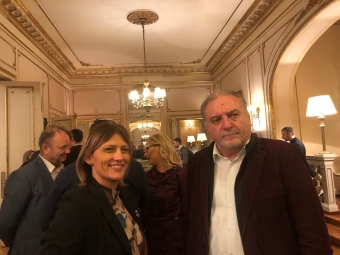
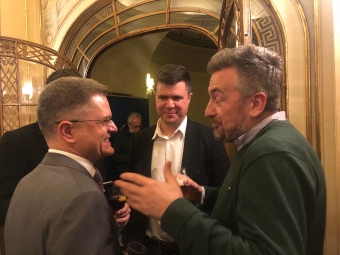
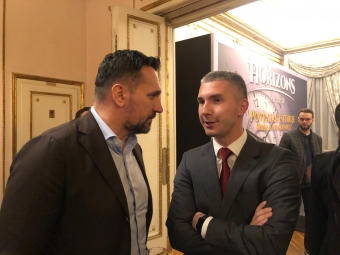
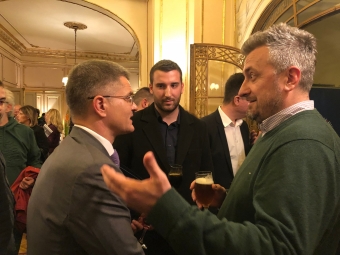
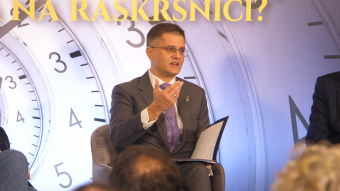
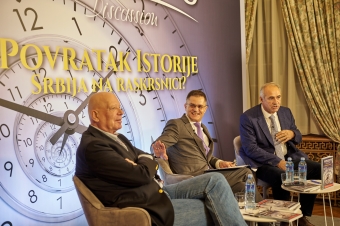
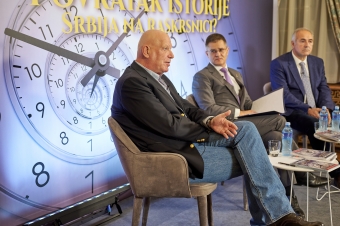
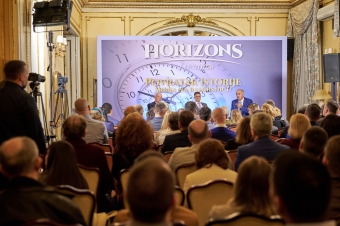
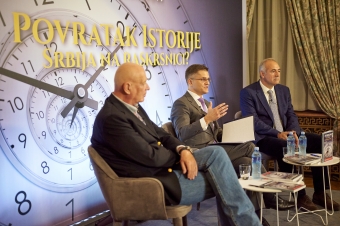
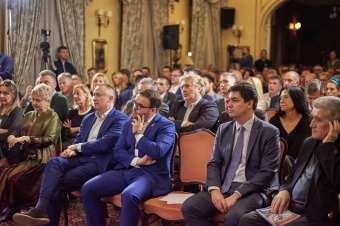
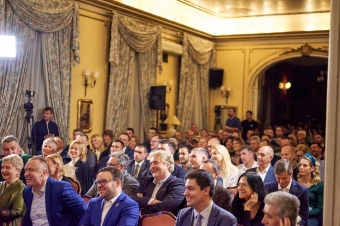
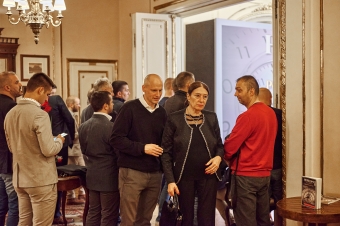
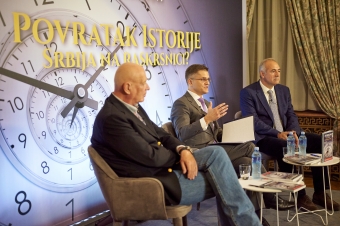
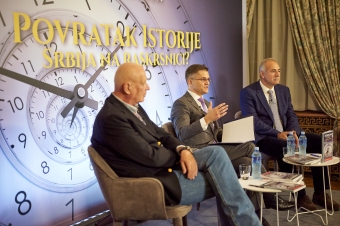
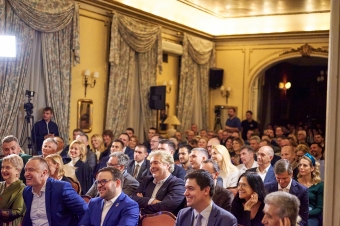








 “In 1914 … the Great Powers were behaving in a more or less similar way—rather ruthlessly. … What we need to do is move away from the idea that war is a suitable or rational way of resolving human conflict, and come instead to an acceptance of view that war is the greatest failure of humankind.” – Christopher Clark, University of Cambridge
“In 1914 … the Great Powers were behaving in a more or less similar way—rather ruthlessly. … What we need to do is move away from the idea that war is a suitable or rational way of resolving human conflict, and come instead to an acceptance of view that war is the greatest failure of humankind.” – Christopher Clark, University of Cambridge “We are now at the end of the post-Cold War era that began with the collapse of the Soviet Union, the end of the Japanese economic miracle, the events in Tiananmen, the signing of the Maastricht Treaty, and Operation Desert Storm. These events framed a new international reality, held up by three main pillars. The first one was the United States, the second was Europe coming together not only as a free trade zone but promising to emerge ultimately as the United States of Europe—the enormously wealthy and powerful region counterbalancing the United States—and the third one was China. Between August 8th 2008 and September 15th 2008, this world began going to pieces.” – GeorgeFriedman, Stratfor
“We are now at the end of the post-Cold War era that began with the collapse of the Soviet Union, the end of the Japanese economic miracle, the events in Tiananmen, the signing of the Maastricht Treaty, and Operation Desert Storm. These events framed a new international reality, held up by three main pillars. The first one was the United States, the second was Europe coming together not only as a free trade zone but promising to emerge ultimately as the United States of Europe—the enormously wealthy and powerful region counterbalancing the United States—and the third one was China. Between August 8th 2008 and September 15th 2008, this world began going to pieces.” – GeorgeFriedman, Stratfor
 Panelists approached the crisis in Ukraine from different and sometimes conicting vantage points, but all seemed to agree that Russia, the EU and the United States are making moves in an increasingly tumultuous region of Eastern Europe in which each party seek to alter the balance of power in their favor. Natalia Narochnitskaya explained that Ukraine’s former President Viktor Yanukovych understood too late that the proposed association agreement with the EU would “destroy Ukrainian industry, primarily located in the east of the country.”
Panelists approached the crisis in Ukraine from different and sometimes conicting vantage points, but all seemed to agree that Russia, the EU and the United States are making moves in an increasingly tumultuous region of Eastern Europe in which each party seek to alter the balance of power in their favor. Natalia Narochnitskaya explained that Ukraine’s former President Viktor Yanukovych understood too late that the proposed association agreement with the EU would “destroy Ukrainian industry, primarily located in the east of the country.”
